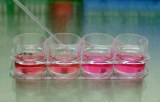3D cell culture media are specialized formulations designed to support the growth, differentiation, and function of cells cultured in three-dimensional environments. Unlike conventional 2D culture media, 3D cell culture media must provide optimal nutrient supply, maintain physiological pH and osmolality, and accommodate the complex microenvironmental needs of cells growing within scaffolds or spheroids. These media are critical for replicating in vivo-like conditions, enabling more predictive and physiologically relevant models in drug discovery, tissue engineering, cancer research, and regenerative medicine.
Key Features of 3D Cell Culture Media
-
Nutrient-rich formulations – Contain balanced amino acids, vitamins, inorganic salts, glucose, and energy sources tailored for 3D growth demands.
-
Growth factor supplementation – Often enriched with serum or defined growth factors to support cell proliferation, differentiation, and extracellular matrix (ECM) production.
-
pH and osmolality stability – Designed to maintain homeostasis in 3D cultures, where diffusion limitations can affect local microenvironments.
-
Compatibility with scaffolds and hydrogels – Media formulations support cell viability within natural or synthetic scaffolds, such as collagen, Matrigel®, alginate, or synthetic hydrogels.
-
Serum-free and chemically defined options – Available to reduce variability and enhance reproducibility in sensitive applications, including stem cell culture and clinical translation.
Advantages of Using Optimized 3D Cell Culture Media
-
Enhanced physiological relevance – Supports complex cell-cell and cell-matrix interactions, promoting realistic gene and protein expression profiles.
-
Improved cell viability and function – Enables long-term culture of primary cells, stem cells, and co-cultures in 3D, preserving native phenotypes.
-
Facilitates advanced models – Critical for generating organoids, spheroids, and tissue-like constructs used in disease modeling and drug screening.
-
Supports scalable and reproducible research – Essential for high-throughput screening and translational studies requiring consistent culture conditions.


